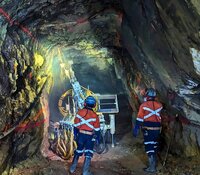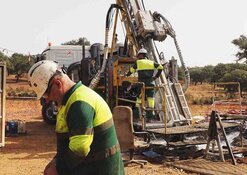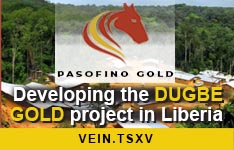Imagine the craggy backbone of the Andes, that serrated ridgeline separating Argentina and Chile. Hidden between San Juan Province (Argentina) and the Atacama Region (Chile), scientists have revealed what experts are calling one of the most astonishing mineral discoveries in three decades: Lundin Mining Corp. (LUN:TSX; LUNMF:OTCMKTS) and BHP Billiton Ltd.'s (BHP:NYSE; BHPLF:OTCPK) Vicuña Mineral Resource.
This isn't your average deposit — it contains an incredible 13 million tonnes of copper, 32 million ounces of gold, and 659 million ounces of silver.
The discovery encompasses two primary areas:
- Filo del Sol, containing over 600 Mt at approximately 1.14% Cu equivalent
- Josemaria, holding nearly 200 Mt at roughly 0.73% Cu equivalent
Jack Lundin, CEO of Lundin Mining, shared an ambitious outlook: "Vicuña could evolve into a tier one global mining district for copper — and also one of the world's largest gold silver producers."
The Revolutionary Impact on South American Neighbors
If you're thinking, "Great, another mining operation," you're not alone!
But this extends far beyond excavation and drilling. Copper — and silver, to some extent — are fundamental elements of our modern energy economy.
Copper: The Essential Element of the Energy Revolution
Copper is to electricity what water is to life. It's essential in:
- Energy distribution: High-voltage transmission lines, substation equipment — virtually every aspect of electricity delivery depends on copper's conductivity.
- Energy creation: In turbines — from natural gas to hydroelectric to wind — electrical coils are copper-wrapped.
- Electric vehicles: EVs contain 3–4× more copper than traditional automobiles due to batteries, motors, and wiring systems.
- Green energy: A single offshore wind turbine can house over 5 tonnes of copper (in wiring, generators, transformers).
An impending supply shortage increases copper's strategic importance. For example, CRU Group predicts a deficit of approximately 7.7 million tonnes annually by the early 2030s. Massive new discoveries like Vicuña could help narrow that gap — and normalize prices.
Silver: Beyond Decorative Applications
Indeed, silver sparkles. But it also conducts — particularly in electrical and energy applications:
- Solar technology: Silver paste is crucial in solar panel manufacturing, allowing electrons to flow from the silicon wafer.
- Electrical components: Numerous switches, fuses, and connectors rely on silver plating for performance.
- Power storage & electronics: Silver is utilized in battery contacts and industrial electronics — essential for intelligent grids and automation.
As solar markets and electric vehicle adoption accelerate, demand for silver likewise increases — at least until viable substitutes emerge.
How Vicuña Accelerates the Green Energy Shift
1. Substantial Boost to Copper Availability
Chile already wears the title of world's premier copper producer (5.3 Mt in 2023), with mining comprising 60% of exports and 20% of GDP. Argentina, though historically overshadowed, is rapidly gaining ground. Under President Javier Milei, comprehensive reforms (tax incentives, reduced regulations, financial freedom) are attracting investment. BHP, Lundin, First Quantum Minerals Ltd. (FM:TSX; FQM:LSE), and others have established operations.
A Reuters projection from late 2024 suggests mining exports (particularly copper and lithium) could increase to US$10 billion by 2027, up from approximately US$4 billion in 2024. That's economic transformation — massive infrastructure investments, electrical networks, transportation systems, and well-paying employment. It's the momentum that transforms nations.
2. Expanding Silver Output
Argentina and Chile together are already leading silver producers — Chile ranked seventh globally in 2023. With silver embedded in the Vicuña deposit as a secondary product of copper extraction, both countries will likely increase production.
This matters, since solar manufacturing and energy storage require dependable silver sources — ideally obtained from politically stable, ESG-compliant operations like Chile and Argentina.
3. Cascading Effects
- Supply networks: Copper processing, refining, wire manufacturing, turbine and EV component production — all can be situated nearby. Consider new industrial centers, local processing, and export infrastructure.
- International relations: With the U.S.–China rivalry for critical minerals intensifying, South American suppliers add strategic diversity and resilience.
- Social development: Infrastructure — highways, educational facilities, medical centers — accompany mining investments, though environmentally responsible approaches are vital (water usage, alpine ecosystems, indigenous rights).
Copper, Silver & the Clean Technology Explosion
Let's examine the statistics:
| Technology | Copper (kg/unit) | Silver (g/unit) |
|---|---|---|
| EV (complete)* | 75–100 | <50 |
| Solar PV (per MW)* | 4–6 tonnes | 20–30 grams |
| Wind Turbine (2 MW)* | 5–6 tonnes | negligible |
- Electric vehicles: A standard passenger EV requires 75 kg of copper — roughly 4× that of conventional vehicles.
- Solar installations: Each megawatt installed consumes 4–6 t of copper plus silver contact points.
- Electrical infrastructure: Copper is fundamental with few alternatives (aluminum is heavier, less efficient).
Silver, though smaller by weight, still serves crucial electronic functions that aren't easily replaced.
Challenges on the Horizon
No major deposit becomes operational without obstacles.
Environmental & Cultural Considerations
Mining in the Andes must respect delicate ecosystems — high-altitude aquifers, biodiversity, and ancestral territories. Waste management, air quality, water consumption — all require stringent oversight.
Infrastructure Deficiencies
High-voltage electrical lines, railway connections, shipping facilities, accommodation for employees — these don't materialize instantly. Argentina, particularly, has fallen behind but is now allocating US$20 billion to copper projects and necessary infrastructure.
Regulatory & Political Uncertainties
Argentina's reforms show promise — but consistency is crucial. Previous fluctuations regarding foreign investment, restrictions, and fiscal policy could deter capital if not addressed.
The Broader Context: A Continental Shift in the Green Economy
Chile has dominated copper production for decades — but Argentina is now emerging rapidly. Together, they're establishing a South American powerhouse for metals central to decarbonization — copper, lithium, silver, gold — along with future-critical elements like molybdenum and iodine.
If Vicuña reaches its complete potential, the widespread effects include:
- International markets: Stabilizing copper and silver prices, decreasing reliance on single-source nations.
- National transformation: Argentina's ability to export USD 6–10 billion annually in copper, strengthening currency stability and employment creation.
- Energy transition: Supporting the deployment of EVs, wind, solar, grid modernization — not distant concepts, but tangible lifestyle changes everywhere.
Here's why this narrative matters:
- Investment signal: We're entering an exceptional metals cycle. Argentina and Chile offer both scale and political indications of accessibility.
- Renewable energy implications: Demand for copper and silver continues unabated. Vicuña represents a strategic asset in that global initiative.
- Societal impact story: From rural communities to grid modernization, local developments will shape — not impede — the clean growth agenda.
From Pebble Creek to Vicuna: Untapped Gold Perfect for NatGold Tokenization
This isn't merely a wealthy mountain; it's a connection between today's economic frameworks and tomorrow's energy economy. Vicuña represents a cornerstone in the emerging South American metals renaissance — a story of geology, international politics, and sustainable energy ambition.
Copper remains the conduit of electrification. Silver continues as the pulse of intelligent, renewable, and digital systems. Argentina and Chile, long underrepresented in the mineral world's realm of giants, may soon possess the keys to powering entire decarbonization pathways.
And if they balance it correctly — harmonizing investment, regulation, and sustainability — we might be witnessing the emergence of two new economic powerhouses shaped by nothing more glamorous than rock, metal, and determination.
But don't overlook the gold component in this equation.
Embedded within Vicuña's interior lies over 32 million ounces of gold — a fortune by any standard. Yet in today's political, environmental, and financial climate, much may never reach a refinery. It's too expensive. Too controversial. Too gradual.
And that's where NatGold Digital Ltd. enters the picture.
NatGold isn't involved in extraction — it specializes in liberation. Using blockchain technology and a patent-pending tokenization system, NatGold transforms certified underground gold into secure, asset-backed digital tokens tradable worldwide.
Projects like Vicuña are ideal candidates.
- Enormous verified reserves
- Favorable jurisdictions
- ESG challenges that postpone mining — but not tokenization
- High public confidence and transparency
- Authentic, tangible gold — simply waiting to be monetized
With NatGold, waiting for mine construction becomes unnecessary.
The Vicuña discovery exemplifies what NatGold was created for.
- To release the value, not the material.
- To restore control to investors, not bureaucrats.
- To enable global gold ownership — without excavation.
| Want to be the first to know about interesting Special Situations, Gold, Silver and Copper investment ideas? Sign up to receive the FREE Streetwise Reports' newsletter. | Subscribe |
Important Disclosures:
- As of the date of this article, officers and/or employees of Streetwise Reports LLC (including members of their household) own securities of NatGold Digital Ltd.
- Brian Hicks: I, or members of my immediate household or family, own securities of: NatGold Digital Ltd. My company has a financial relationship with: None. My company has purchased stocks mentioned in this article for my management clients: None. I determined which companies would be included in this article based on my research and understanding of the sector.
- Statements and opinions expressed are the opinions of the author and not of Streetwise Reports, Street Smart, or their officers. The author is wholly responsible for the accuracy of the statements. Streetwise Reports was not paid by the author to publish or syndicate this article. Streetwise Reports requires contributing authors to disclose any shareholdings in, or economic relationships with, companies that they write about. Any disclosures from the author can be found below. Streetwise Reports relies upon the authors to accurately provide this information and Streetwise Reports has no means of verifying its accuracy.
- This article does not constitute investment advice and is not a solicitation for any investment. Streetwise Reports does not render general or specific investment advice and the information on Streetwise Reports should not be considered a recommendation to buy or sell any security. Each reader is encouraged to consult with his or her personal financial adviser and perform their own comprehensive investment research. By opening this page, each reader accepts and agrees to Streetwise Reports' terms of use and full legal disclaimer. Streetwise Reports does not endorse or recommend the business, products, services or securities of any company.
For additional disclosures, please click here.






































